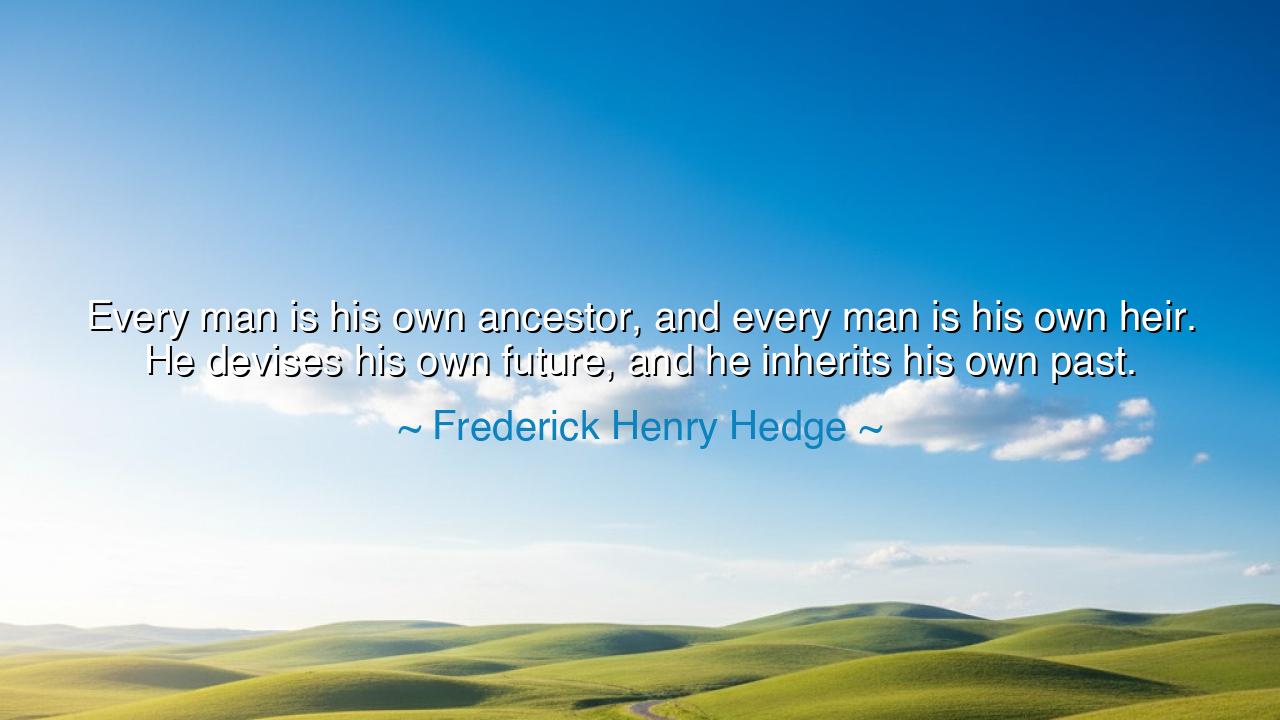
Every man is his own ancestor, and every man is his own heir. He
Every man is his own ancestor, and every man is his own heir. He devises his own future, and he inherits his own past.






The words of Frederick Henry Hedge—“Every man is his own ancestor, and every man is his own heir. He devises his own future, and he inherits his own past”—echo like the wisdom of an ancient oracle, carrying with them the gravity of self-realization and the mystery of human destiny. Within these few lines lies a truth both humbling and exalting: that man is the architect of his becoming. He is both the seed and the fruit, the beginning and the continuation of his own story. Hedge speaks not merely of time, but of the eternal chain of cause and effect that binds a person to his choices, his habits, and his spirit.
To say that one is “his own ancestor” is to say that each day, through thought and action, we give birth to the person we will become. Our past selves—each decision, each mistake, each triumph—are not ghosts that fade away; they are the foundations upon which we stand. The ancients understood this deeply. They believed that the soul carried within it the weight of its own deeds, that fate was not imposed from without but born from within. So too does Hedge remind us that we are heirs to our own lives—that the fruit we taste tomorrow is grown from the seeds we plant today.
The origin of this quote lies in Hedge’s reflections as a philosopher and Transcendentalist of the nineteenth century. He was a contemporary of thinkers like Emerson and Thoreau, who sought to uncover the divine principle within man—the idea that self-reliance and moral responsibility were not burdens but sacred powers. In his view, man was not a creature cast into existence at the mercy of chance or lineage; he was the heir to his own spiritual lineage. “Every man is his own ancestor” meant that we do not merely inherit the blood of others—we inherit the spirit we have shaped through time, through our own moral evolution, through the invisible legacy of our choices.
Consider the life of Nelson Mandela, whose journey embodies this truth. As a young man, he was fiery, restless, and bold. Years of imprisonment transformed that fire into light—patient, unwavering, and powerful. By the time he emerged, he was no longer the man he once was. Yet, it was that earlier self—the rebel, the dreamer—that gave birth to the sage and statesman he became. Mandela’s past self became his ancestor, and his wisdom, his peace, his dignity were the inheritance of his own suffering and growth. His life was not a series of disconnected moments, but a living continuum—a tree rooted in the soil of his own becoming.
This, too, is the message Hedge imparts: that our past is not a chain to bind us but a resource to guide us. Every failure teaches resilience, every sorrow deepens empathy, every victory strengthens faith. The wise do not curse their past, nor do they flee from it—they inherit it with gratitude, knowing it is the wealth of experience that shapes their destiny. The past is not gone; it lives in us as memory, instinct, and insight. And the future is not distant—it begins now, in the present moment, as we “devise” it through our choices.
The ancients would have seen this truth in the myth of the phoenix, the bird that rises from its own ashes, born anew from what it once was. Each rebirth is not a rejection of the past but its fulfillment. So it is with us: we are constantly dying and being reborn within our own lives. Each sunrise gives us the chance to inherit our past and craft our future. To deny our past is to deny the soil from which our strength grows; to neglect our future is to waste the seed of our present. The two are not separate—they are one, joined by the living thread of who we are becoming.
So, my child, learn from Hedge’s wisdom: you are the ancestor and the heir of yourself. Do not wait for fate or fortune to shape your life—shape it yourself, for every thought and action is a chisel upon the stone of your being. Look upon your past not with regret but with reverence, for it has built the foundation of your soul. And look toward your future not with fear but with resolve, for it is your own hands that will construct it.
Thus, remember these sacred words: “He devises his own future, and he inherits his own past.” In this truth lies both freedom and responsibility. You are your own lineage, your own legacy. What you do today becomes the ancestor of who you will be tomorrow. Live, then, with intention. Build with care. And when you look back upon the path you have walked, may you find not regret, but gratitude—that you, through wisdom and will, have become both the builder and the inheritance of your own destiny.






AAdministratorAdministrator
Welcome, honored guests. Please leave a comment, we will respond soon